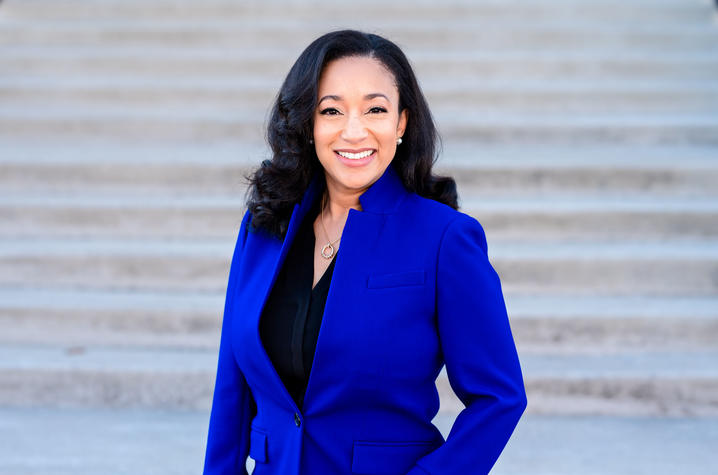Stevens-Watkins helps lead $2 million NIH grant to support underrepresented faculty

LEXINGTON, Ky. (Jan. 18, 2023) — University of Kentucky Professor Danelle Stevens-Watkins, Ph.D., is one of two principal investigators leading a five-year, $2 million grant from the National Institutes of Health (NIH) to support underrepresented minority faculty at predominantly white institutions across the U.S.
“We want to equip faculty to not only cope, but to thrive, despite the structural barriers that exist in settings where they are one of few faculty of color, or perhaps the only one in their area,” said Stevens-Watkins, UK College of Education acting dean, UK associate vice president for research, diversity & inclusion and a professor of counseling psychology in the UK College of Education Department of Educational, School and Counseling Psychology.
Stevens-Watkins serves as principal investigator along with Vanderbilt University's Renã Robinson, Ph.D., Dorothy Wingfield Phillips Chancellor’s Faculty Fellow and professor of chemistry. Co-investigator Aileen Reid, Ph.D., an assistant professor at the University of North Carolina Greensboro, will lead evaluation efforts for the program.
Together, they have designed the Faculty Accomplished Community that Cultivates Equity and Success in Science (ACCESS). This mentorship-based program will help improve levels of social support for underrepresented minority faculty.
“Faculty of color are often invisible and yet hyper visible. We stand out because there are so few individuals and faculty of color on campuses, yet we are invisible in many of the ways that foster career development and career advancement,” Stevens-Watkins said. “Having mentors who can share their lessons learned in navigating the political landscape, norms and unwritten rules in academia is invaluable knowledge faculty may not receive anywhere else.”
Senior-level faculty of color across the nation quickly signed on as mentors as Stevens-Watkins and Robinson reached out. They believe that eagerness to help stems from a universal knowledge and understanding of the hardships and triumphs faculty of color experience and a desire to be part of a program designed to help early and mid-career scholars thrive.
The program formalizes the kind of support Stevens-Watkins and Robinson have provided each other as friends and colleagues who grew up together in Louisville. It also draws upon their training and backgrounds — Stevens-Watkins’ as a social scientist and Robinson’s as a biomedical scientist.
“We were trained in different fields but have been successful in navigating this challenging teaching and research system together. Our friendship started in our youth and continued through school, in various jobs as teens in Louisville and now as professors well-established in our careers. We have been that friend each other can call. The timing was right to say we need to put our heads together to help other scholars the way we helped each other,” Stevens-Watkins said.
Programming will be tailored to foster success for early- and mid-career faculty in biomedical science fields. Sessions will center on wellness and explore how to cope with a range of issues, including race-related stress and burnout. The program will also provide training in writing publications and proposals to increase NIH grant submissions and awards.
“One of the primary goals of this program is to increase the number of underrepresented minority principal investigators funded through the NIH,” Stevens-Watkins said. “To decrease racial and ethnic health disparities, we need pathways to have more representation among highly successful biomedical researchers from diverse backgrounds.”
Stevens-Watkins and Robinson agree that recruiting a diverse group of scholars into biomedical research fields is necessary, but they say it is equally important to create environments and social support systems to help people stay in those fields.
“If faculty have a sense of belonging, they will be more likely to find success and continue to work in these areas, making an impact on critical health issues,” Robinson said. “I am thankful our universities have been fully supportive of our application and that the NIH is making this investment. I look forward to seeing the growth of individuals thriving in academia, doing high-level research they are passionate about and that makes a difference.”
An initial cohort of established senior faculty from various backgrounds has been recruited and is scheduled to meet with mentees during a kick-off session May 18-20 on the UK campus. Stevens-Watkins expects the event will set collaborations and mentorship in motion and be a source of encouragement.
“There is something powerful about being in a room full of faculty of color that are successfully tenured and have landed an NIH R01. This sends the message that this level of achievement is indeed possible,” she said.
Research reported in this publication was supported by the National Institute of General Medical Sciences of the National Institutes of Health under Award Number R25GM147296. The content is solely the responsibility of the authors and does not necessarily represent the official views of the National Institutes of Health.
As the state’s flagship, land-grant institution, the University of Kentucky exists to advance the Commonwealth. We do that by preparing the next generation of leaders — placing students at the heart of everything we do — and transforming the lives of Kentuckians through education, research and creative work, service and health care. We pride ourselves on being a catalyst for breakthroughs and a force for healing, a place where ingenuity unfolds. It's all made possible by our people — visionaries, disruptors and pioneers — who make up 200 academic programs, a $476.5 million research and development enterprise and a world-class medical center, all on one campus.




